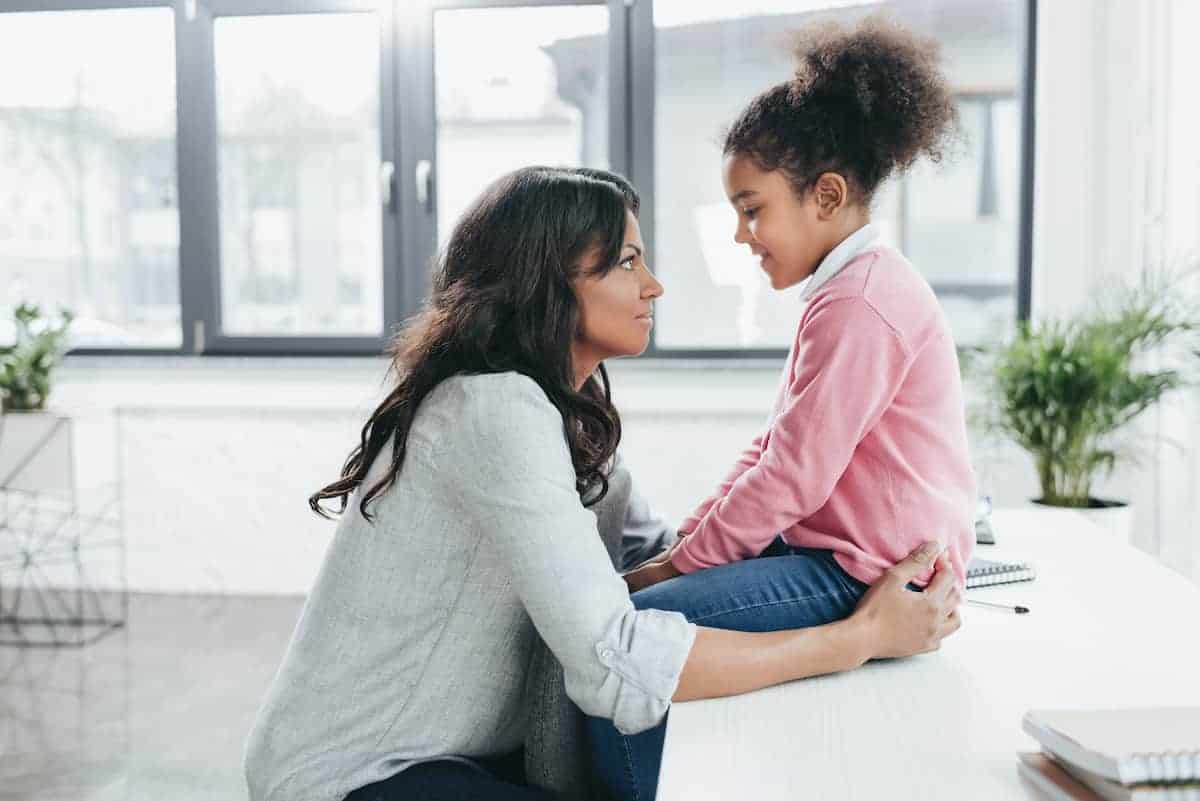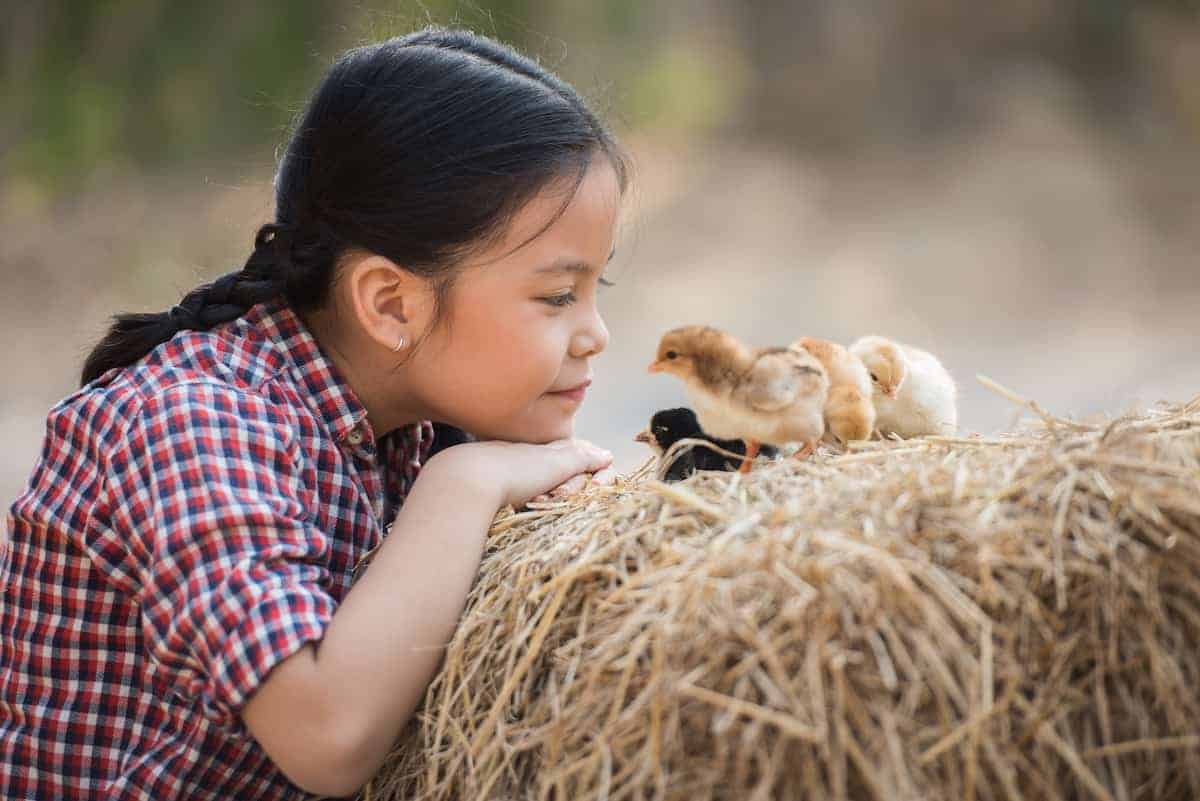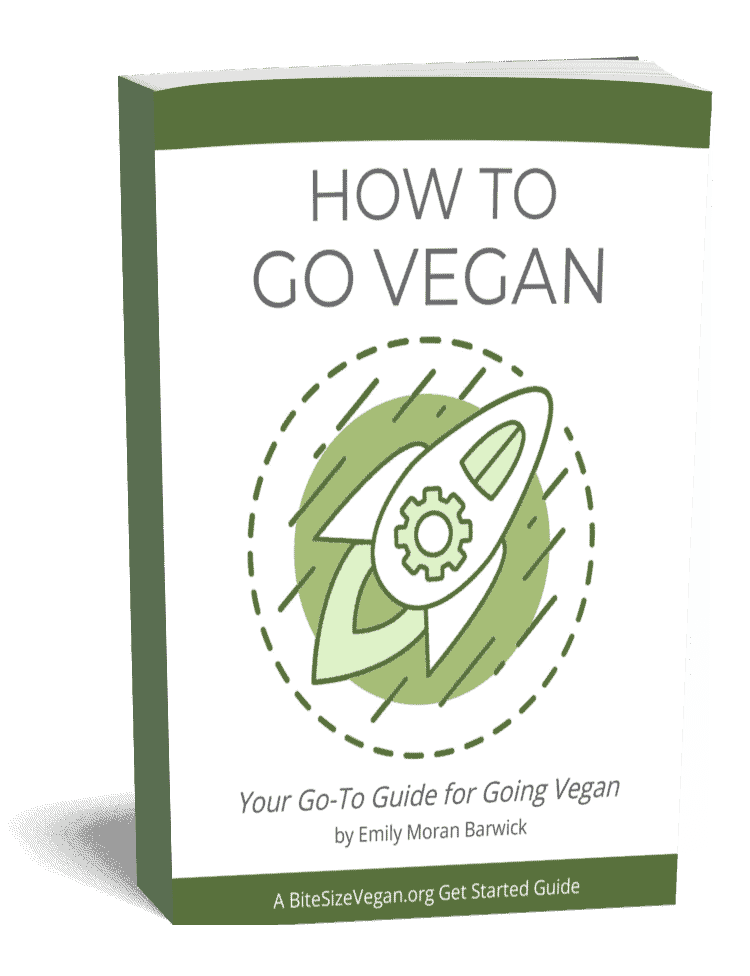Unsure how to talk to kids about veganism? Learn how to teach children about veganism with this comprehensive guide. How can you be truthful without being traumatizing? How can you convey complex concepts in an age-appropriate way? Get guidance on explaining veganism to kids!
Talking to anyone about veganism can be a daunting proposition. When it comes to talking to kids about veganism, things get even more complicated. How do you make sure to be truthful without being traumatizing? How can you convey complex concepts in an age-appropriate way? Well, let’s talk about…how to talk to kids about veganism. tweet this
Before we dive in, I wanted to let you know that I have content about veganism made just for kids that can do a lot of the talking for you! Be sure to check out my Vegan Videos for Kids series, which covers everything from dairy, eggs, meat, wool and honey, to the environmental impact of animal products. I also interview real vegan kids!
A Quick Note on the Concern of “Forcing” Veganism
I wanted to note that any discussion about veganism and children usually elicits concern about forcing one’s beliefs upon a child. Fortunately, I have a video covering that exact topic in my Vegan Parenting Series. That series also covers topics like whether vegan kids are prone to struggle socially, whether we’re born vegan, and nutritional concerns.
Assess the Situation and Context When Talking to Kids About Veganism

Whenever you’re talking to someone about veganism, it’s important to assess the situation and context of your conversation. When talking to children about veganism, this is even more vital. Were you asked an off-hand question? Or is this a sit-down one-on-one? Or are you perhaps in a classroom setting?
Perhaps the most important point of context is whether you’re speaking with your own child(ren) or someone else’s. Obviously, you need to be respectful of the boundaries and wishes of a child’s parent(s) or caregiver(s).
If you’ve found yourself in a situation where someone else’s child has asked you a question about why you don’t eat animals, be mindful not to disparage non-vegans in your response. Focus instead on your reasons for being vegan. You don’t want the child to feel they or their caregiver(s) are bad. This is actually a productive approach across the board for non-vegans of any age.
Tailor Your Approach to the Child
It’s impossible to give a blanket instruction on how to talk to kids about veganism. Every child is an individual, with their own personality, temperament, sensitivities, maturity level, and learning styles. What may be entirely appropriate and effective for one kid may not be for another.
I, for example, have always said that I came out of the womb as a 35-year-old. I was a very serious child and almost too aware of the realities of the world from very early on. As such, I appreciated the rare times when adults were straightforward with me. But the level of harsh reality I was able to take in was not always appropriate for other kids my age. It’s always best to tailor your approach to the child you’re speaking with.
Be Age-Appropriate Without Sugarcoating

That said, there are some general guidelines that are helpful when speaking with very young children. Kids are incredibly intelligent and very often underestimated or even dismissed by us adults. When I was a kid, I vowed to never forget what it was like being discounted.
This doesn’t mean that my educational content for children is identical to the content I create with an adult demographic in mind. There is a very vital difference between sugarcoating and delivering a message suitable to one’s intended audience.
You can respect a child’s right to the truth without traumatizing them with an approach inappropriate for their age or temperament. In every one of my videos for kids about veganism, I say upfront that I promise to tell them the truth, no matter what. I also assure them that I will not show them anything scary. Given I cannot know the exact age of the children watching my content, I err on the side of the youngest viewers.
The environmental, societal and health-based reasons for veganism are less of a concern when it comes to age-appropriateness. When teaching very young children about the ethical basis for veganism, and our treatment of animals, you can tell them the truth in a way they can understand and process by speaking in relatable terms.
For example, in my video for kids about milk, I explain how mother cows produce milk for their babies, just like humans do. But because humans want to drink the mother cows’ milk, her baby is taken away and put into tiny cages where they can’t even turn around. I tell them how mother cows cry for days for their babies because they miss them so much, just like their parents would miss them.
While this is a very heavy and unpleasant topic, I remind them that I promised to tell them the truth. Most importantly, I am sure to end every video with the good news that all this suffering can be avoided by choosing not to consume animal products.
Use Visuals, Stories, and Interaction When Teaching Kids About Veganism
Children respond to visual stimuli, and will be more engaged with stories and interactive experiences than lectures. If you watch my videos for kids, you’ll notice I have a lot of visual animation throughout. Another great tool is the growing number of vegan-themed children’s books, which provide characters and stories kids can engage with while learning about veganism.
One of the most powerful ways for kids to connect with the ethical aspects of veganism is to visit a farmed animal sanctuary, where they can come face to face with the individual animals. This is also a fantastic alternative to exploitative animal entertainment industries like circuses, zoos, and aquariums.
Focus on the (Many) Positives of Veganism & Provide Actions They Can Take

Focusing on the many positives of veganism is key when speaking with children. The realities of our treatment of animals and the impact it has on the environment, our health, society, and—most disturbingly—the animals themselves, is a lot for anyone to take on, much less a child. So while it’s important to explain these realities in an age-appropriate manner, it’s at the same time vital to emphasize the power of veganism.
Children are empowered when given actions they can take to make a difference. For example, by drinking plant milk instead of cows’ milk, they can help mother and baby cows stay together. Or that by not eating meat, they can save animals’ lives and help alleviate world hunger. This shifts the focus from the problems to solutions in which they can participate.
In my video for kids focusing on the environmental and societal impact of the animal products industries, I frame the entire discussion as how they can save the planet with the actions they take and the choices they make.
I explain the environmental devastation of animal products, and how we divert so much of our crops to animals raised for food that we could be feeding to hungry people. While I emphasize that it’s us adults who have gotten the world into this state, I focus on the power kids have to be a superhero to the planet, the animals, and their fellow humans.
It’s also important to provide alternatives to foods and activities that children have developed an affinity for. Going vegan is often viewed as giving things up. Be sure to emphasize all the vegan options available. As I mentioned earlier, this applies to far more than food: in my video for kids about zoos, I offer alternatives that aren’t harmful to animals, like visiting farmed animal sanctuaries.
Children Have Less to Un-learn
Talking to kids about the ethical aspects of veganism isn’t about convincing them of anything. It’s simply providing them with well-deserved truth so that they may act in accordance with their existing values.
tweet this— Emily Moran Barwick
I find children are often far more receptive to the underlying concepts of veganism than most adults.
In many ways, educating adults about veganism is really just trying to help people reconnect with the fundamental truth that we all knew as children: that it’s not okay to hurt others.
After all, we have to be taught as children to disassociate the animals we adore from the flesh and secretions on our plates.
We watch Finding Nemo, then are fed fish sticks. We love Babe the pig, then are fed bacon.
This is a learned disconnect that we continue to develop as adults, adopting justifications and rationalizations for our discordant choices.
Studies into speciesism—meaning the valuing of one’s own species over all others—have shown that young children “appraise the lives of animals and humans similarly when asked to judge the act of killing…signaling that speciesism is a socially-transmitted idea that may not surface until relatively late in development.”1
A study into children’s ability to identify the origins of their food showed a significant lack of awareness, especially when it came to animal products. Thirty-six to forty-one percent of the children thought that “hamburgers, hot dogs, and bacon come from plants.”2
When asked what was OK and not OK to eat, the vast majority of younger children in the study designated cows, pigs, and chickens as not OK to eat.
Talking to kids about the ethical aspects of veganism isn’t about convincing them of anything. It’s simply providing them with well-deserved truth so that they may act in accordance with their existing values.
In Closing
I hope that this video and article have provided some helpful guidance in educating kids about veganism. Be sure to check out my Vegan Videos for Kids series to do the talking for you! To stay in the loop about new Bite Size Vegan content and updates, please sign up for the newsletter or follow the Telegram channel for the most reliable notifications. To support educational content like this, please consider making a donation. Now go live vegan, and I’ll see you soon.
— Emily Moran Barwick







You’re back Emily!!!
Hi James! Yes I’m “back”. I’ve been back for a while now actually! If you’d like to catch up, please check out all the new videos and articles. Also, see my post announcing the “re-launch” of Bite Size Vegan! To stay updated about new content, do be sure to subscribe! :)
Emily, I am a nanny and I am vegan. I find it hard to talk to parents when the tell me the respect my choice to be an animal activest but tell me theie Dr said it’s mandatory for their children to have animal products to thrive when I know it is completely unnecessary. Also I live with a Pescatarian who believes I should respect others choices.
Hi Mary, I totally understand your struggle. I worked as a nanny as well, and also for many years worked with individuals with disabilities in a variety of settings. I had to prepare meals with animal products, and it was very distressing. It’s even harder to be told it’s necessary or “good” for them. You can still respect someone’s choice without endorsing it or agreeing to the premise. That’s why I always approach my activism and education from the stance of people’s right to know the truth. So it’s not about telling them what to do, but rather coming from the approach of their RIGHT to know. Of course, with kids whose parents are making the choices, that complicates matters! Still, if the kids you work with ask you why you eat the way you do, as I say in this video and article, you can answer them openly and honestly with YOUR reasons, without casting judgment upon them or their parents. It’s a fine line, and I totally empathize with the challenge of your situation. Sending you much love.
Animals are our friends. We don’t eat our friends.
Succinct, simple, and spot-on explanation, chee chow :)
Dear Emily, I hope that you are doing good. I am indeed thankful that you are on Earth doing Animal Angel Action. Talking to children about Veganism being very close to my heart, being a mom, grandma and teacher and Animal Rights Activist too. I love all that you mentioned and am glad that I have been doing it like that too, though indeed the one important thing you mentioned that I didn’t do enough, is to incorporate more visual content. Huge thank you HUG 🤗 🕊💗🌱
Hello Mitzi! Thank you so much for your kind words and for sharing your experience. I am also VERY thankful for your work as a teacher! Teachers are heroes :) I’m so glad that you resonated with this. Much love to you!
I live in Vancouver and I have been able to save a ton of money since becoming a vegan over 30 years ago. My food budget is $1 per meal and it used to be much less than that but because of inflation it is approaching $1 per meal. The trick is to buy bulk and don’t eat out. One would not be able to do $1 a meal if the diet contain dairy and meat. Imagine how much money I have saved over 30 years. Yes $1 a meal can be done with plant based diet. We should teach everyone inlcuding children about saving money via plant based diet, good for planet, animals, health and wallet. And most importantly we are getting good karma.
Another great video Emily. When it was over, i thought, “Wow…already?!”…meaning…it was so engaging & interesting, time flew by! Also very easy to comprehend, even though you are clipping along. I never have to stop the video and re-listen to parts. Nuances that are so important but taken for granted. Basically, you are a master communicator/educator. Thank You so much for all you do. with love & respect, Juli VEGAN VICTORY!
Wow! Thank you so much, Juli! This comment means THE WORLD to me! I put a great deal into the structure and timing of my videos in the hopes of achieving precisely what you’ve described. I SO, SO treasure your feedback. Thank you for taking the time to share this with me!
Again, your (compassionate, sane, smart) videos have moved me. I, too, was a very serious kid who vowed never to forget what it was like to be a kid. I rarely got honest answers to my many questions.
Thank you again for your kind approach: as a baby vegan (vegetarian throughout adulthood but only 5 months vegan now), your site is still one of the few places I can recommend where someone can feel encouraged to grow and learn rather than be ostracized for ignorance.
Wow. I cannot express how encouraging and validating your comment is to me! I’m honored that you find my website to be a safe and effective resource to recommend to others. It’s my most sincere intention to make veganism approachable and accessible for all. To provide information for people to evaluate for themselves because they have the right to it, rather than an approach of imposing judgement. It means the world to me that this is how my work has come across for you!
And I totally feel you about being a serious kid. I think many adults aren’t really sure how to deal with kids asking difficult questions. :) Many thanks for taking the time to share this with me. Again, I’m honored.